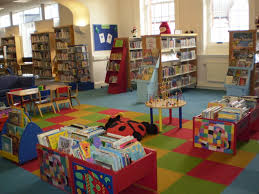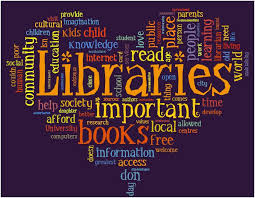I was on Granma Duty yesterday, well it's not a duty, more of an exhausting pleasure.
After we'd been to the park and become completely frozen in the biting wind, we 'warmed up' in the library. The children's area is colourful and welcoming and there's a large variety of books.
 We headed for the baby board books (or books for bored babies as I call them), then sat down on tiny stools to read at the table. I promptly fell off the stool so decided that perhaps us sitting on the play mat to read would be a better option.
We headed for the baby board books (or books for bored babies as I call them), then sat down on tiny stools to read at the table. I promptly fell off the stool so decided that perhaps us sitting on the play mat to read would be a better option.
We got through about twelve books in our hour there - twelve books which she hadn't seen before. And I know that next time we go there will be even more for her to enjoy.
Although she has lots of books at home, it's great to look at different book; especially nice for me as reading the same book over and over again can eventually become tiresome!
I liked being able to choose books to interest her this month - and to introduce different subjects to her.
 The librarians are always very helpful and don't mind the pushchair cluttering up the space. So aren't we lucky to have a library nearby!
The librarians are always very helpful and don't mind the pushchair cluttering up the space. So aren't we lucky to have a library nearby!
I just wish the Council could afford for it to be open more than three and a half days a week but very pleased to have one at all.
Here's an article by Joanna Trollope extolling the virtues of public libraries and how useful they are in our lives:
Flexible and digitised, our libraries have a bright future
Libraries are a golden thread running through our lives - and we have a chance to make that thread gleam brighter
I have, in a grim week, some good news for you. Not just good, but clear, concise and practical news. It is the publication yesterday of some important recommendations which don’t involve spending trillions the country hasn’t got in the first place, and which will improve the lives and futures of a huge proportion of the population. Fast.
The – perhaps unlikely – stars of this published report are our public libraries. Not, you might think, an immediately sexy subject. But it can be. And if the panel of yesterday’s Sieghart report on the future of libraries has its way, it will be. In England, more than a third of the population visits their local library. In the poorest areas of the country – and at least 20 per cent of the population have no digital technology at home – that number rises to a half.
The need has never been greater for a modern, safe, non-judgmental, flexible place where people can mine the knowledge of the world for free. Nor has the need for the help and wisdom of professionals to guide them through the complexities of information gathering ever been more pressing.
A local library, if you think about it, underpins every community. Yes, it is there for self improvement, but it also can, and should, be a supplier of a complete infrastructure for life and learning, from babyhood to old age, offering support, help, education – and the limitless joy of reading. A library can help you with anything from understanding your pension rights, to applying for a job, to learning about the genealogy of your family or the drama of classical Greece.
A lot of modern libraries in England are already fantastic: light, clean, comfortable, welcoming, innovative and impressive. They are rammed with people. So are many of the little local ones which have become what their immediate communities require of them, offering spaces and services to accommodate local needs.
The notion of a library being a hushed and dusty accumulation of outdated books housed in an Edwardian mausoleum presided over by fierce martinets is long gone. The library of the present – and, more importantly, the future – is something else altogether.
The thing is, and especially in these days of sharply reducing local government budgets, that none of the recommendations for the libraries of the future is going to cost a fortune. And the benefits that they will deliver are huge.
There have been umpteen reports on libraries in the last few years, all of which have come to nothing, but with the right determination and energy, this one can be game-changing in helping the population to thrive on the best that progress can bring.
The Sieghart review recommends a few key things. The roll-out of a national digital resource throughout England, to all public libraries, delivered in partnership with local authorities. The setting up of a “task and finish” force (that is to say, not merely yet another quango) led by local government in order to help local authorities improve, revitalise, and, if necessary, change their libraries.
And that’s it, really. Except for the librarians. We can’t do any of this without the librarians. They should be recognised for the huge and significant role they play in modern society already, but they need to be augmented by the recruitment and training of equally high-calibre personnel for the future.
Someone said, in the course of carrying out the review, that “libraries are a golden thread running through all our lives”. Well, here’s an equally golden chance to polish it up for the future.
Telegraph, Friday 19 December 2014: http://www.telegraph.co.uk/culture/books/11301894/Flexible-and-digitised-our-libraries-have-a-bright-future.html
No comments:
Post a Comment